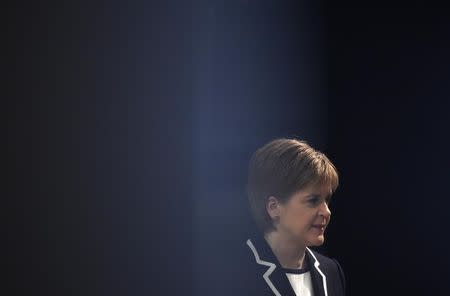Cameron's EU deal may disappoint wavering British voters - Sturgeon

By Kylie MacLellan LONDON (Reuters) - Prime Minister David Cameron's renegotiation of Britain's relationship with the European Union might not have done enough to persuade undecided voters to back staying in the bloc, the nationalist leader of Scotland said on Monday. Cameron, who is campaigning for an 'In' vote at a June 23 referendum, has said a deal reached with the EU earlier this month addresses voters' key concerns with the bloc through measures such as curbing EU migrants' access to some welfare payments in Britain. But pro-EU Scottish National Party (SNP) leader Nicola Sturgeon, who heads Scotland's devolved government, said renegotiation was "too grand a word" for what Cameron had achieved. "Nothing in that was going to change my view as someone who wants to stay in, nothing in it was going to change the view of an arch Eurosceptic who wants out of Europe come what may," she said during a question session after a speech in London. "The danger is for those perhaps in the middle ground who were looking to that to try and make up their mind, it is an inevitable disappointment, because it didn't live up to what was promised." Sturgeon said she hoped the vote would result in an "overwhelming" victory for the 'In' camp, but while she would be campaigning on the same side as Cameron, she did not plan to share a platform with him. "We want the same outcome from slightly different perspectives ... if he appeals to people who agree with him and I appeal to people who agree with me then we will maximize the vote for staying in," she said. Scots rejected independence by 55-45 percent in 2014 vote but since then the SNP has gained further strength, taking 56 of the 59 seats representing Scotland in the national parliament in London in last May's election. Polls show a majority of the 5 million Scots back staying in the EU, and Sturgeon repeated her claim that if Scotland were taken out of the bloc against its will there would be a rising "clamour" for a second independence referendum. If that were to happen, Sturgeon said she was confident Scotland could remain a member if the EU. "I would expect that many people in the European Union and across Europe would want to see Scotland seek to stay in," she said. (editing by Michael Holden)

